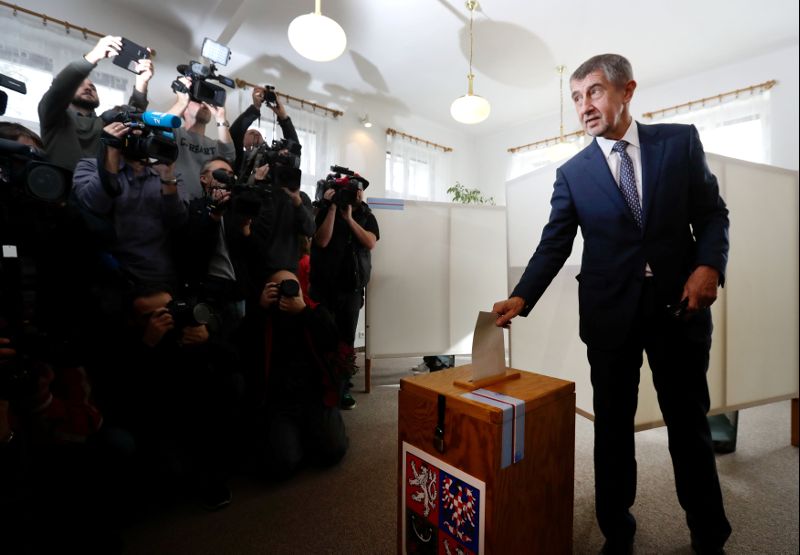
The leader of ANO party Andrej Babis casts his vote in parliamentary elections in Prague, Czech Republic October 20, 2017. REUTERS/David W Cerny
October 20, 2017
By Jan Lopatka
PRAGUE (Reuters) – Czechs started voting on Friday in a parliamentary election expected to hand power to Andrej Babis, a wealthy businessman turned politician who has pledged to sweep aside traditional parties, boost investment and keep out refugees.
The central European country has enjoyed rapid economic growth, a balanced budget and the lowest unemployment in the European Union, but opinion polls nevertheless show strong voter support for Babis’s ANO movement and other protest parties.
Although immigration to the Czech Republic is virtually non-existent, fear of it has played a big part in the campaign, with nearly all parties pledging to fight any attempts by the EU to force the Czechs to accept refugees distributed across the bloc.
The anti-immigrant mood mirrors similar trends in neighbouring countries. Parties opposed to immigration scored highly in elections in Germany last month and Austria last week, and have fed scepticism toward the EU across the 28-nation bloc.
The ANO movement, set up and tightly controlled by Babis, has won support from both the right and left with pledges to cut taxes and replace corrupt politicians and with its calls to seal Europe’s borders and not accept a single refugee in the country.
ANO has maintained its rhetoric of opposition to the ruling system despite serving in the outgoing government along with Prime Minister Bohuslav Sobotka’s centre-left Social Democrats and the centrist Christian Democrats.
Czech elections are spread over two days. Voting began on Friday at 2 pm (1200 GMT) and will end at 2 pm on Saturday. Turnout traditionally oscillates around 60 percent of the country’s 8.5 million voters.
Final surveys before a polling blackout began on Tuesday gave ANO, which means “Yes” in Czech, about 25-27 percent support, at least twice that of its nearest rival, the Social Democrats, although that level indicates a slight decline.
SCANDALS AND WARNINGS
Babis’s support has weathered a number of scandals as well as warnings from political rivals about him acquiring too much power if he becomes prime minister. He is the founder of a vast business empire spanning farming, chemicals, food and media.
“Let’s not leave the country to oligarchs,” Interior Minister Milan Chovanec, the acting head of the Social Democrats, tweeted on Friday in an appeal to Czechs to vote.
The election outcome may be a coalition similar to the outgoing one but with ANO at the helm. This would mean no big change in a foreign policy that aims to balance close ties with neighbours Poland and Hungary with a pragmatic approach towards the EU and countries such as Germany, the main foreign investor and export market.
But Babis’s swipes at Brussels, which play well with the eurosceptic Czechs, have raised concern that he might lead the country into a more confrontational relationship with the EU, emulating the right-wing governments in Warsaw and Budapest.
Babis opposes more EU integration and euro adoption, but has also spoken of the benefits of EU membership and says the Czech Republic should play a bigger role in reforming the bloc.
“I would not expect an earthquake (from the election result),” said Martin Mejstrik, political scientist at Prague’s Charles University.
“The most likely option is the three-way coalition that has been there. These parties (the Social Democrats and Christian Democrats) have not ruled out working with ANO,” he added.
The prospects for a deal with ANO’s current partners or with centre-right parties may run up against their demands that Babis personally stay out of the cabinet because he faces police charges of fraud in drawing a 2 million euro subsidy for a conference centre a decade ago. He denies any wrongdoing.
There is an outside chance that Babis may form a minority government supported by the Communists and the far-right anti-EU Freedom and Direct Democracy Party (SPD), which saw its support jump in the final opinion polls.
Analysts see any such tie-up as unlikely. It would be negative for the markets and would pose questions over future policies toward the EU.
(Additional reporting by Jiri Skacel, Robert Muller and Jason Hovet; Editing by Gareth Jones)

